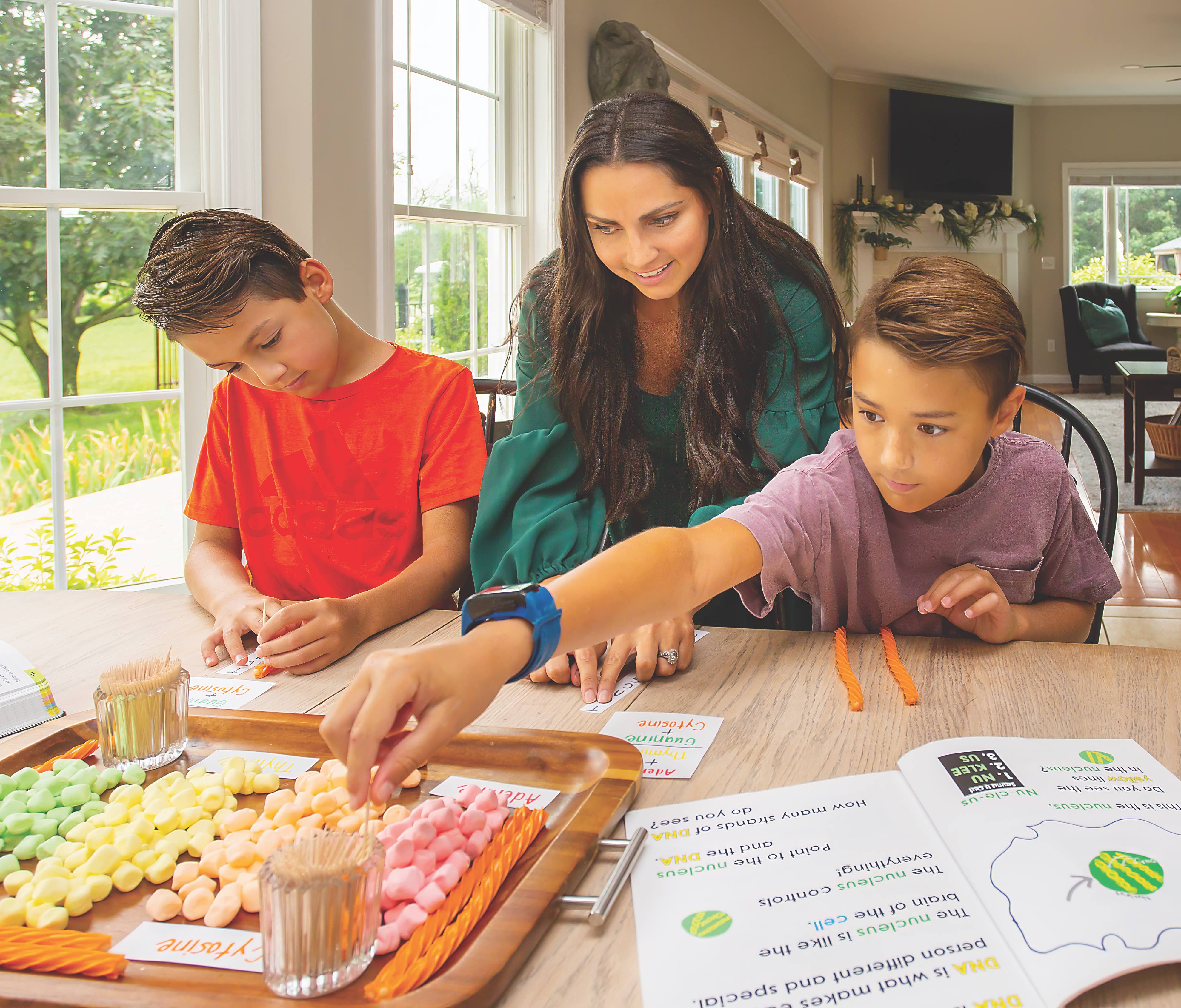
More parents are taking education into their own hands
By Andrew Sharp
Photograph by Carolyn Watson
From the September 2023 issue

For one cohort of students in southern Delaware, their school experience is missing a notable piece: the school building.
The youth services librarian at the Rehoboth Beach Public Library, Elizabeth Miller, knows this phenomenon well. She coordinates a regular program that brings area home-schooled students to the library for fun (Sharpie tie-dye shirts, for example) and education (squid dissection). It’s a partnership with the Lewes, Georgetown and Milton libraries, which also host sessions.
Miller is perhaps more intimately acquainted with home-schooling than your average librarian, because she learned at home herself from fifth grade on.
She sums up one of the strengths of the home-based approach this way: A traditional classroom “has a lot of great things you can learn, but they also don’t always honor a child’s strengths. We all have different learning skills. And no matter how great a teacher may be — and we love our teachers, absolutely — it’s going to be impossible for them to accommodate every single different type of learning styles.”
Coastal Delaware is known for many things, but home-schooling is not at the top of that list, so it may come as a surprise that there are enough such children around to merit a library program at all. But Miller says the program drew at least 15 participants to each gathering over the past school year.
Home-schooling was once considered a fringe educational option, but it has gained more mainstream acceptance, especially once many parents experimented with it during the COVID pandemic. Still, the uninitiated often have questions and concerns.
Talk to a home-school parent, and they’ve heard them all. Often, they themselves had the same hesitance before exploring the approach.
“I was very anti-home-school. I’m a teacher by trade,” recalls Rachael Savini, who lives in the Milford area and has been enthusiastically using her skills to educate her children since 2019.
“I think everyone just assumes that home-schoolers wear pajamas all day, they go outside all day, they’re not really learning anything,” she notes. “They might be visiting a library every now and then or just get thrown a workbook.”
Not so, she counters. They do all the normal schooling — they just do it as a family and not all in one place.
“I’ve seen now how beautiful it can be, how family-centered, how every child can be seen and thrive,” Savini says.
Pondering the Choice
Talking to a home-school parent can call to mind the enthusiasm of a craft brewing hobbyist or a home baker. They’re all undertakings mostly done in our society on an industrial scale, but since the pandemic they have spiked in popularity as fulfilling do-it-yourself activities.
Like other DIY aficionados, home-schoolers like to mix and match, experiment, compare methods and blog about it.
In eastern Sussex County, parents cite a number of motives for choosing this educational method. They’re drawn by everything from flexible schedules to a more community-centered lifestyle, a customized education for the unique needs of their children, and the ability to make religious or other dearly held values part of their education. They’ve come to believe that they can do this better than would be possible in a traditional school setting, although they acknowledge the good work those schools often do and recognize that home-schooling won’t work for everyone.
One of Savini’s children, she says, was in sensory overload at school. “Seeing the version of my son at home, being so different than who he was at school, really broke my heart.” Another son, she felt, would have struggled with a rigid schedule, and she wanted to make sure “his entire self was seen, his talents in gymnastics, his talents in reading, his interests.”
She reflects, “Every child is really a special-needs kid. We all have different brains in the way that we learn, the way that we communicate with people.”
For her part, Miller recalls being taught to pass a standardized test in the Florida school system, which “wasn’t really stoking my curiosity or intelligence in a way that was productive.”
The values factor
Home-schooling was once associated primarily with religious groups, especially Christian parents dissatisfied with public schools, but it has been increasingly embraced by secular parents as well.
National researcher Brian Ray has watched that movement evolve for decades. A home-schooler himself who has been part of the conservative Christian strain of the movement, he said he started observing the values-based phenomenon in the early days when home-schooling lacked its modern label and was called home-centered learning.
Even back then, he says, there was always a lot of variety, from back-to-the-land left-wingers to more right-wing Christians. That diversity has increased rapidly in the past decade, he notes, although the motivation is still strongly values-driven, whether parents are Native Americans or Muslims or African Americans who want their education to reflect their values.
Black families often add that they want a curriculum more focused on their own heritage, and they may see public schools as discriminatory toward their children, especially boys, Ray observes.
Concerns about what her children were learning about race and history was a major consideration for Laura Rizer, a secular home-schooler whose family lives near Frederick, Md., but owns a home in Ocean View. Not only does home-schooling give them the flexibility to spend more time at their beach house, it also allows Rizer to ensure that they are learning what she sees as a full view of history.
For example, she has concerns about recent controversies in public education over book bans and the teaching of the country’s often bitter racial history.
“I want [my children] to be exposed to different cultures, to different perspectives, to real history — you know, not whitewashed history. … Sometimes people don’t want to talk about hard topics like slavery and the Holocaust and things like that, so they kind of gloss over it.”
Attitude adjustment
Whatever the reasons for home-schooling, perceptions of it have shifted as more people embrace the practice. In the past, few people actually knew anyone who did home-schooling. But that changed significantly because of COVID.
Milford mom Aly Martin says her children had been enrolled in public and private schools, and she didn’t think she’d ever home-school them. But when the pandemic began, she saw one of her sons, then age 5, struggle with the inconsistent schedule and difficulties of remote learning. In his Spanish immersion program, he was trying to pick up the language from a teacher on Zoom who was wearing a mask, a challenge that would daunt many an older learner too.
“I knew that the schools were doing the best that they could, but I didn’t know what the next year was going to look like. And I thought, I just can’t do this again for him,” Martin says.
She bounced the idea of home-schooling off her children, who weren’t so sure about it but eventually got on board.
While family time is regarded as a plus, Martin was a little worried about suddenly having so much of it, and she also wondered how she would juggle the roles of parent and teacher. She thought she would try it for a year, then put her children back in a traditional school.
But “I just saw them kind of come alive with their excitement to learn. … They were able to dive into things deeper that they enjoyed, and that they found interesting.” At the same time, Martin adds, she built closer relationships with her children.
Martin was far from alone. The nation saw a huge spike in home-schooling as COVID dropped a bomb on the entire education system. In 2022, the Associated Press analyzed data from 18 states that track home-schooling numbers.
It found a 63 percent increase in home-schooled students in the 2020-21 school year, the first full year after the pandemic started. That number dropped a bit the following year, but still stayed high.
Delaware saw a similar trajectory. There were about 3,100 home-schooled students in 2019, per state records. The 2021-22 school year saw a 45 percent jump in enrollment to more than 4,500.
Some of those children are back in traditional school now, but like the Martins, other families have stuck with it. In the past school year, 3,450 Delaware students got their education at home, still higher than in 2019. (For further details, see “Home-Schooling by the Numbers” on page 63.)
Over and back
Lisa Tudor of Lewes was living in Northern Virginia when the pandemic started, and like many parents was struck by the uncertainty school systems were dealing with.
Tudor, who describes herself as a fact-finder, dove in, thinking more critically about how education worked and researching different curriculums.
She asked a home-schooling neighbor for advice: “I called her up and I was like, ‘I kind of have this idea, OK, but I don’t know what the hell I’m doing.’”
Her ultimate choice to home-school her two children wasn’t driven by religious reasons. Tudor found herself evaluating curriculums, making sure they reflected her family’s values, a process other secular home-schoolers also mention. It led to some deeper conversations with her husband about how to raise their children.
She enjoyed the flexibility of home-schooling, with the freedom to explore science or nature, or to learn while traveling. They would study while having a picnic in the park, and got to take a trip to Colonial Williamsburg.
Tudor also was able to identify an area in which one of her children needed extra support, a need she’s not sure she would have noticed without the close interaction of home-schooling.
Then the pandemic wound down and the family moved to Lewes for a quieter lifestyle. Once there, they enrolled their children in the Cape Henlopen School District. That decision stemmed from multiple factors. “It was a lot of time with my kids,” Tudor explains. Her children were also elementary age, so she felt she could handle teaching them, but she was doubtful about her abilities if they started more challenging subjects down the road.
“I really did consider if I wanted to keep doing it, because I loved seeing how my kids personally grew, how my kids thrived,” she says. The experience opened her eyes to exploring different ways to provide education, and for now she’s planning to send her children to a new charter school opening in Georgetown next fall, the Bryan Allen Stevenson School of Excellence.
As for home-schooling, “it’s not a hard no, but it’s kind of a no for now.’”
Straddling two realms
Another home-schooling mom, Rhonda McDowell-Cipolla, of western Sussex County, didn’t choose between public school and home education at all. She went with both, seeing advantages for her children in the different education styles.
“For two of my children, I felt like the routine and consistency and structure of the public school was going to be better for them,” McDowell-Cipolla says. It’s a fluid situation — one of her traditionally schooled children is weighing whether to join her two home-schooled siblings.
While some observers worry that kids won’t get a strong education if they are educated at home, it’s the opposite for McDowell-Cipolla, who thinks her children would miss some academic opportunities if they were in public school.
On the other hand, she appreciates the structure and consistency of the latter, and that children learn to listen to other adults. She also values the racial diversity a traditional school can provide. With adopted and foster children, McDowell-Cipolla has a mixed-race household, and she notes there aren’t many Black home-schooling families in the area.
“Racial mirrors are really important. And so that’s another one of the things that I have to think about — what are my kids going to see? What are they going to be exposed to, what’s going to be most successful for them in the future? And I keep all those things in mind when I’m trying to figure out and navigate where we go.”
Plays well with others?
That desire for kids to succeed is top of mind for parents, and often for concerned family members too. But the idea of home-schooling often prompts worries about how kids might miss out in one key way: socialization.
This concern — that children may be isolated at home and won’t learn to interact well with other kids or adults — does not match the experience that local home-schoolers describe. They often seek out other families to form co-ops, which hold group activities, or multi-family home-schools, where parents share teaching duties.
Rizer, the part-time Ocean View resident, says her co-op is a source of friends and social activities. “There’s a lot more to socialization, I think, than the seven hours of a [traditional] school day,” she elaborates, questioning whether scooping up everyone from a neighborhood and putting them in school to spend all day with kids the same age is really the best social opportunity.
“I definitely love our home-school group,” Erin Kidd says. She’s director of Classical Conversations of Lewes, a Christian-based co-op that offers a group session with a paid tutor once a week. About 50 children take part.
“That’s been wonderful, having that flexibility one day a week and being able to do other things, field trips and park meet-ups. There’s such a large … home-school community in the area.”
For Rehoboth librarian Miller, the library was key to her home-school experience — and she’s not just saying that because she works at one now. In fact, it’s the other way around: She embraced her career choice partly because of spending so much time in a library as a home-schooled student, and loving it. “I went to every single event that I could’ve possibly managed.”
Kidd has taken advantage of the home-school programming at the Lewes Public Library and at Delaware’s state parks. “There’s almost too many resources in our area for home-schoolers,” she says, listing art and gym classes and science fair groups as examples.
Savini’s co-op gets together every week for joint learning, which can include hands-on science experiments: “So if that was making replicas of DNA or using microscopes and watching the behavior of worms, it was just a lot of fun to experience as a whole group.”
Martin says of her children, “I feel like they have more social opportunities now than they ever have, honestly. It sounds crazy.”
Relaxing into the role
A bigger concern for many parents early on is the quality of their children’s education.
Though she had studied early childhood education before switching to nursing, Talon Holleman, a home-schooling parent who lives east of Georgetown, was intimidated starting out. She notes that this kind of worry is common in her circles.
“A lot of times the parents [wonder], very early on, ‘Am I doing enough? Is my kid learning what they’re supposed to?”
But the Hollemans actually let their children learn beyond their grade level, if they’re ready for it. This underscores a familiar point for parents: Public schools have to bring along the whole group of children at the same pace, when some could learn faster.
Others have had similar experiences. “I have a sixth-grader who’s in public school … and my home-schooled third-grader helps her with her homework,” McDowell-Cipolla says.
She has relaxed over time as she’s become more confident in her teaching ability, and now offers educational programming, including for home-schoolers, at libraries throughout Sussex County.
At first, McDowell-Cipolla made sure to follow a set
routine and check all the boxes. “And now [I say], ‘Let’s just learn stuff.’”
It’s not that parents aren’t worried about basic reading and math skills — quite the opposite. But with time, they grow confident that a less structured teaching environment will still impart the necessary knowledge.
Many of the parents explain education options to their children and offer them the chance to weigh in on whether they want to continue home-schooling or go a more traditional route.
“It is a partnership between us, in my view,” Rizer says. “We’ll do this as long as it makes sense, so as long as they want to do it.” So far, the vote has been very positive from her twins, Jacoby and Evan, age 11.
Jacoby is a fan of not having to get up so early for school — that flexible schedule coming into play again. There is only one thing Evan misses — getting to ride on the school bus.
Other children are wistful about that too.
“That’s the only reason they say they want to go to a public school, because they want to ride a bus,” Holleman says of her kids. “And I’m like, I’m going to rent a bus one day for the home-school community.”



